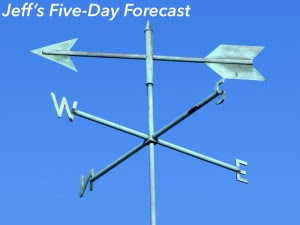You’ve heard this one before:
A man was late for an important meeting and couldn’t find a parking spot. As he frantically circled the block, the man became so desperate that he began to pray. Looking up to heaven he said:
“Lord, have pity on me. If you find me a parking place, I’ll promise to never miss church again. Not only that, I’ll stop my cussing, my gambling, my drinking and my carousing.”
Miraculously, a parking space appeared.
The guy looked up again and said, “Never mind. I found one.”
Isn’t it convenient that our prayer life expects everything without actually contributing anything? I think it was Flip Wilson who once said,
“I’m gonna pray now; anyone want anything?”
Parents, imagine what it would feel like if the only contact that you had with your children was when they were asking for something (it occurs to me that this may be hitting a little too close to home).
The patterns, motives and content of our prayer lives may reveal something unsavory about the health of our souls. It may be time to consider our vital signs:
-For what do you find yourself praying?
-When and how frequently do you pray for these things?
-Have you noticed a correlation or spike in the frequency of your prayers when you need or desire something?
-What have you offered to God?
I fear that if left unchecked our prayer life will reveal a self-centered attitude with God. Our prayers may just reveal ourselves to be superficial and selfish, dictatorial and presumptive. In the framework of Jesus’s breathtaking prayer at Gethsemane, we pray for our will to be done—and we’re foolishly hopeful that God will change His will to accommodate our own.
Y’all, this is not how the ‘created’ are supposed to talk to their Creator. Repentance, humility and respect for God’s Divine Presence seems to be in order, here.
A holy posture of listening to God could be a good first step in strengthening our relationship with Him. In short, we may just be doing too much talking and not enough listening. ‘Monologuing’ with your spouse or best friend may be cathartic, but it doesn’t reveal a particularly healthy or balanced relationship. Just as we would bristle at a friendship where someone simply talks at us, we would be wise to consider that our relationship with God has got to be more than our litany of needs and concerns.
God wants more from us than our to-do lists.
I suspect, however, that the reason we don’t listen to God is because we don’t want to hear what God may have to say to us. That’s also probably why we no longer read the Bible like we should, or why we get so defensive when someone challenges our way of thinking.
Besides, listening is hard work. To be a good and effective listener, we’ve got to yield to the Other. We’ve got to sacrifice our right to fill the silence. Listening means that we tune out the myriad of other competing voices and claims on us. Listening means choosing to be present. Listening means letting go of our fantasies—past, present and future. Listening means creating space to consider and reconsider.
Gratitude and praise are forms of listening. By acknowledging that for which we are thankful, we are looking and listening for the ways God has been present with us. By praising God, we place him above ourselves and naturally turning our attention to the One who has a claim on us.
If I may be confessional, I will gladly admit that as a pastor listening is the most important thing I do each day and by far the hardest thing I do each day. Why? Listening takes time and the right attitude. It means making myself available to the Spirit of God and to others. In truth, it would be easier to see my tasks and responsibilities as a kind of punch-sheet, and hammer away to achieve that delicious moment of completion and accomplishment. But doing so would mean that my work would be my own. Listening means yielding. And I find that my work is far more effective when it is Spirit-filled and Divinely-inspired. In order for God to be present in my offering of service, I’ve got to first listen to Him.
Mother Teresa, I believe, says it best of all:
“Prayer is not asking. Prayer is putting oneself in the hands of God, at his disposition, and listening to his voice in the depths of our hearts.”
Perhaps we should ask for something when we pray—open ears and hearts to listen to God’s voice.












